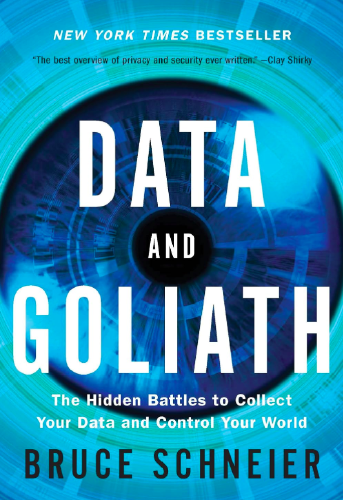
Data and Goliath: the Hidden Battles to Collect Your Data and Control Your World
A comprehensive critique of mass surveillance, exploring how governments and corporations collect, use, and abuse personal data, and offering practical and policy solutions to protect privacy in the digital age.
Review:
Bruce Schneier’s “Data and Goliath” is a landmark work on the realities and dangers of mass surveillance in the 21st century. Drawing on his expertise as a renowned security technologist, Schneier exposes the vast scale at which governments and corporations collect, analyze, and exploit personal data—often with little oversight or accountability.
Key Facts and Arguments:
Scope of Surveillance: Schneier details how both state actors (notably the NSA and other intelligence agencies) and private companies (from telecoms to tech giants) engage in pervasive data collection. He documents the rise of “ubiquitous surveillance,” where nearly every digital interaction—emails, phone calls, web searches, location data, and more—is tracked, stored, and analyzed.
Government vs. Corporate Surveillance: The book explores the symbiotic relationship between government and corporate surveillance, showing how data collected for commercial purposes is often shared with or requisitioned by state agencies. Schneier highlights the Snowden revelations as a turning point in public awareness, but argues that the problem is far broader than any one leak or agency.
Privacy vs. Security: Schneier is nuanced in his approach: he acknowledges that some degree of surveillance is necessary for law enforcement and national security, but warns against the “manufactured moral panics”—from terrorism to gang violence—that are used to justify ever-expanding surveillance powers. He is skeptical of the effectiveness of mass surveillance in preventing crime or terrorism, and argues that it often comes at the expense of civil liberties and democratic accountability.
Health Data and Research: The book controversially supports the use of anonymized health and biometric data for medical research, arguing that such data can advance public health while still protecting individual privacy—if managed with strong safeguards.
Risks and Harms: Schneier warns that mass surveillance enables not only government overreach but also corporate manipulation, discrimination, and the erosion of trust in society. He discusses the chilling effects on free speech, the dangers of data breaches, and the ways in which surveillance disproportionately harms marginalized groups.
Solutions and Calls to Action: The final section offers practical advice for individuals (encryption, privacy tools, digital hygiene) but emphasizes that real change requires collective action and policy reform. Schneier advocates for stronger privacy laws, greater transparency, limits on data retention, and robust oversight of both government and corporate actors.
Critical Perspective and Relevance:
While “Data and Goliath” was published in 2015, many of its arguments remain highly relevant, though some examples (such as the focus on Uyghur terrorism in China) may feel dated in light of more recent developments in global surveillance. Schneier’s willingness to draw lines—supporting some forms of surveillance and data use while warning against others—makes the book a nuanced contribution to the privacy debate. His admiration for whistleblowers like Edward Snowden is clear, and the book is both a warning and a call to action for citizens, policymakers, and technologists.
Overall, “Data and Goliath” is an essential primer on the hidden battles over data and privacy, and a foundational text for anyone concerned about the future of surveillance in a digital world.
A bit dated, as shown in the author’s preoccupation with Uyghur terrorists killing Han Chinese. A 2022 version of this book might have an updated take on surveillance in China.
The author tends to favor some degree of police surveillance as a necessary evil, while warning against the manufactured moral panics of the day used to justify surveillance: from terrorism to gang violence and trafficking. He also favors ubiquitous health and biometric data being made available to medical researchers for the advancement of healthcare. Those are debatable lines drawn in the hot sands of the anti-surveillance advocacy desert, but the author makes compelling arguments to justify his stance on each issue.
The author is practically worshipful of Snowden.
All said, a good book for having been written in 2014.